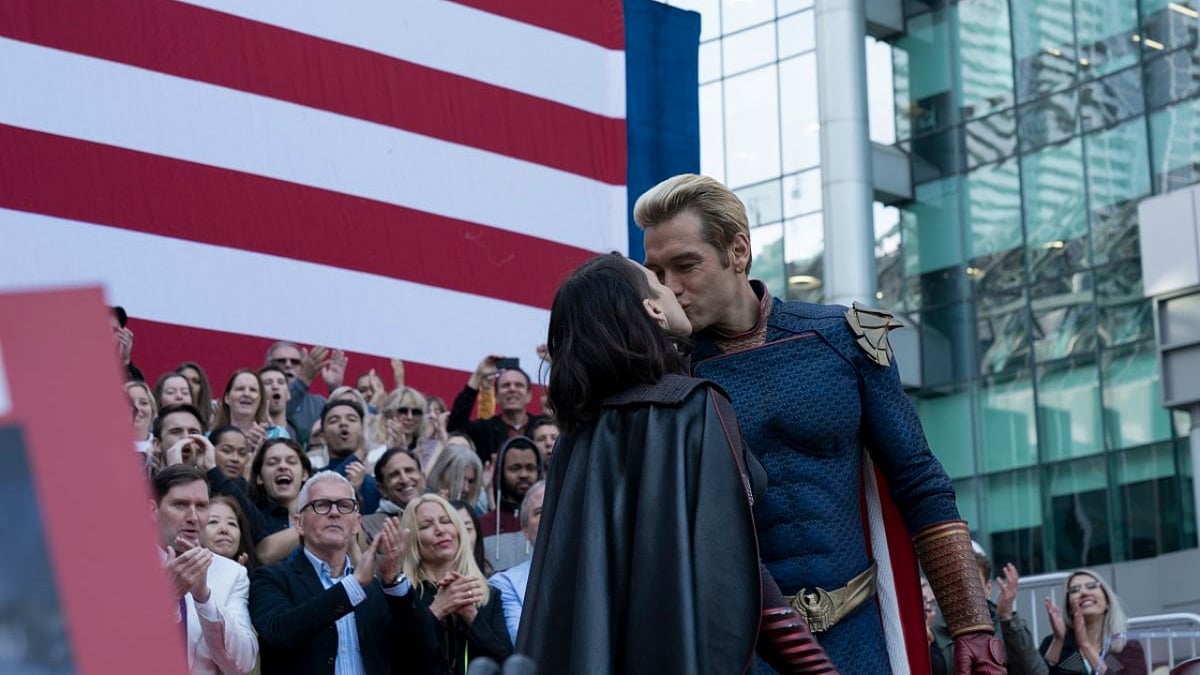'The Boys' and the political zeitgeist of our times
There is a certain subversive brilliance in making Big Spandex fans root against caped crusaders, yet Amazon’s ‘The Boys’ excels on other, much subtler notes

Antony Starr as Homelander and Aya Cash as Stormfront in 'The Boys' | Panagiotis Pantazidis / Amazon
Stan Lee, creator of such characters as Spider-Man, Wolverine, and the Scarlet Witch for Marvel Comics, once said that superhero stories are like fairy tales for grown-ups. The man, whose name has become almost synonymous with cape culture, would in his writing always maintain the inherent “goodness” of a masked vigilante doing that which a normal person wouldn’t, because, as another celebrated comic book writer would later go on to say: “Of course, superheroes aren’t real!”
If pop culture has indeed marked our histories, one could show that this, of course, is not true. In an age oversaturated by superheroes, these benevolent characters permeate our lives. Superheroes are very much ‘real’ — on our T-shirts, mugs, bags, and phone cases. To claim that superheroes are already in our lives wouldn’t be a lie by any stretch of the imagination. But if, say, such forces were actually let loose upon our world, if they actually lived and breathed beside us and been part of the same society as we do, could they have been our enemies? Would we still have rooted for our superheroes as we do on our screens?
There is a certain subversive brilliance in making Big Spandex fans root against caped crusaders, yet Amazon’s ‘The Boys’ excels on other, much subtler notes. The show imagines a world where superheroes are not only real and well-integrated into the society, but instruments of megaprofit as well. Behind the glass walls of the sky-high Vought Tower, ‘The Seven’ (the show’s analogue for the ‘Justice League') spend their formal meetings squabbling over merchandising rights, contractor renewals, and IP royalties, as opposed to solving any real humanitarian emergencies, except only the ones manufactured by PR.
When a “supe” does arrive to salvage a crisis, though, they display an appalling lack of regard for collateral damage to life and property of de-powered bodies. Behind shiny capes and slick hair, these demigods are hardly more than a group of tormented narcissists. When A-Train 'accidentally' runs through Hughie’s girlfriend, causing her body to burst into a million organic splinters, he doesn't even bat an eye. After running away bloodied from the scene, the superpowered speedster even jokes that he’s swallowed one of her teeth. Vought treats the ‘casualty’ like spilt milk, no more important than a Yemeni child hit by a stray Navy SEAL bullet. ‘The Boys’ isn’t concerned about hiding its political commentary.
With its second season finally wrapped up, the show has, by now, had much to say about the political zeitgeist of our times — from the manufacture of public consent by mass media to racism, white supremacy, and hate subcultures. In fact, one could argue that much of the show’s appeal among its now-mainstream fans is derived from its edgy adult content and tongue-in-cheek satire that doesn’t shy away from making political statements, making it aptly relevant as we stand at crossroads marked by heated debates over ideologies and identity. When a morbidly obese man, who lives with his mother and spends his time on online message boards making memes, is play-by-play radicalised by Stormfront’s xenophobic rhetoric and shoots dead an immigrant convenience store clerk, the subtext on alt-right politics isn’t lost on anyone.
Homelander, the show’s unsettling analogue to Superman, is another ripe subject. Donning the American star-spangled banner as his cape, the red-white-and-blue costumed crusader is considered the greatest superhero alive — on the surface a modest Boy Scout but in reality fraught with crippling psychological issues. What Homelander’s unresolved Oedipal fixation on one of Vought International’s top-ranking executives implies about the American state’s dodgy relationship with crony capitalism is all but left to the public imagination. In fact, one of the show’s greatest satisfactions is watching the demigod gradually come to terms with, in a pulpy restaging of Hegel’s master-slave dialectic, the contradictions of his omnipotence and ambition. With his nigh-invulnerability and godlike powers, Homelander is tortured by his ambition and the power to do almost anything. Yet, were he to resort to his most base impulses, he would generate great fear among the very people whose respect he so craves. Once down the rabbit hole, he would then have to keep killing everyone till, in all his nightmares, he becomes truly alone in the entire universe.
Amazon’s ‘The Boys’ respects its audience just enough to acknowledge that within neoliberalism, superheroes are simply another commodity, driven by the free market. Superheroes are already real, they exist everywhere in our personal and political imagination as metaphysical representations of the abstract ideals we glorify. They exist in business deals, Hollywood projects, shady ventures with the military-industrial complex, and mass merchandising. After all, when that which makes up the “good” itself is depoliticised, justice can only ever exist as an instrument of profit. The show doesn’t exist outside the market, it is self-aware — which is why nearly every single character is a grotesque parody of itself and downright morally deplorable.
In a world where the very notions of justice are commodified by the culture industry, the logic of the good, the bad, and the ugly start to become blurred. In such times, Amazon’s ‘The Boys’ is a crucial prompt. If caped crusaders, in all their arbitrary might, did exist in the real world, could they have been our enemies? Of course, they could. Of course, they are.
RECENT STORIES
-
-
-
-
-